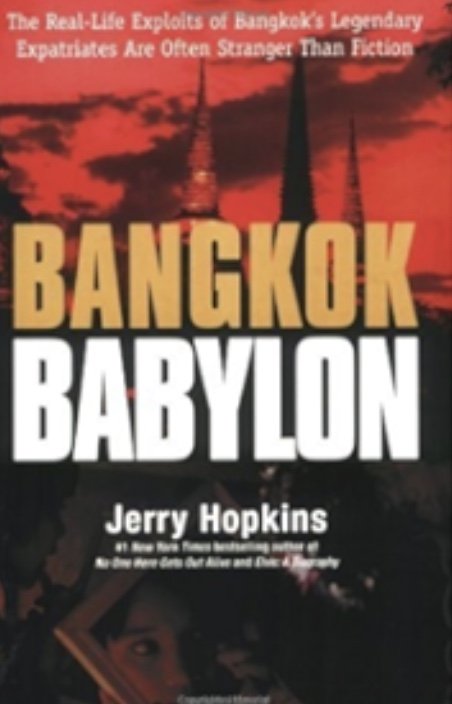Bangkok Babylon by Jerry Hopkins (Tuttle Publishing)
Among any of us who have spent time in Southeast Asia, a common observation is prevalent—that nobody is more tedious than an old white guy who’s rooted to a Bangkok bar stool. Jerry Hopkins, a man who has occupied many a bar stool in Bangkok (and other places), not only disputes that point of view, he refutes it. Telling the stories of men he has met on twenty-five different bar stools in Thailand’s capital, he proves his point of view. At least during his lifetime, some of the most intriguing people on earth were sitting in some of the most notorious bars in Bangkok. In Bangkok Babylon, he tells their stories and there’s not a boring one in the entire book.
Only a few of these are ones Hopkins wasn’t told directly by the profile subjects. He never met the man who has been called the inspiration for the Marlon Brando figure in Apocalypse Now, Tony Poe, nor the pianist who played for years at the best hotel in Bangkok and who turned out to be a vicious pedophile. In the case of the pianist, Hopkins quotes the lengthy confession that Eric Rossner sent to a Thai newspaper and briefly describes a videotape Rossner had made of time he spent with a ten-year-old girl. Tony Poe’s story comes from Poe’s close friend and colleague, Jack Shirley, a man who had been a self-described “journeyman killer” employed by the DEA and who worked with Poe in at least one successful assassination.
These stories are counterbalanced by twenty-two others that are much less lurid but equally fascinating. Hopkins’ best friend, whom he terms an “urban guerilla priest,” is a man who’s devoted his life to the largest Bangkok slum, a rebel who knows how to say the Mass in Hmong and knocks back bottles of Heineken. Father Joe is a warrior who has battled the Thai power structure successfully enough that the slum he lives in now has a school, a 24-hour medical clinic, a credit union, and housing for orphans and abandoned children. His story is followed by interviews with the man who made Lonely Planet’s guide to Thailand a bible to travelers all around the world and with the college drop-out who turned abused elephants into musicians with their own symphony orchestra.
A man who once made his living by dressing up as Friar Tuck and selling advice at Renaissance Faires before making a life for himself in Thailand tells Hopkins “If you’re going to get a story out of me, you’ll have to pull and twist, and then make it up, because it’s not there.” He was wrong. If Hopkins had one religious belief, it was “Thou shalt not make things up.” Disdaining Somerset Maugham as “a predatory gossip,” Hopkins had a thousand untold stories that he refused to write, because, he said, “they aren’t mine to tell.” Every living man whom he interviewed for Bangkok Babylon was given the right of refusal. They each read their profile before the book was published and all of them approved what had been written.
The result is an oral history told by a group of eccentric expats to a reporter who likens himself to Forrest Gump, a man in the right place at the right time, who decided when he was young that he’d “travel the world, meet interesting people, and write about them.” Fortunately, one of the “interesting people” whose story is included in this book is Hopkins himself, a journalist who wrote for Rolling Stone, booked “kooks” for Steve Allen’s television show, had the first head-shop in Los Angeles, and was on the New York Times bestseller list for his biography of Jim Morrison, No One Here Gets Out Alive, which is still in print since its debut in 1980.
Of Bangkok Babylon, Hopkins says somewhat wistfully, “ this book may be a celebration of a part of Southeast Asia that is sliding into the past…” Yes. It is—and a fine celebration at that.~Janet Brown
